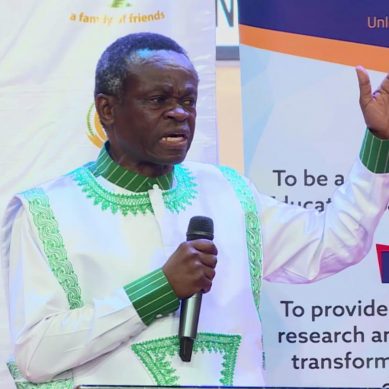From historicisms, rat-stabbers, lions, devils to birds, gods and colours: How nicknames inspire football teams
The Bahamas, aka ‘The Rake and Scrape Boys’, are named after a famous local dance. Demonstration here. It would be a travesty if Egypt were called anything other than ‘The Pharaohs’, while Thailand are menacingly nicknamed ‘The War Elephants’, with the country known for its historical use of those animals in battle.
Sun sets on Tito Jackson, elder brother of pop megastar Michael Jackson and member of Jackson 5 group
Born on October 15, 1953, Toriano Adaryll “Tito” Jackson was the least-heard member of the group as a background singer who played guitar. His brothers launched solo careers, including Michael, who became one of the world’s biggest performers known as The King of Pop. Michael Jackson died at age 50 on June 25, 2009.
Land ethic: In Uganda, state is like an engineer who respects mechanical wisdom because he created it, but disrespects ecological wisdom
The Uganda government is likely to continue with bulldozing the construction of dams in total disregard of sustainable ecology, sustainable environment, sustainable development and environmental justice because it lacks the concept of democratic development, which takes away people’s traditional wisdom, traditions, culture and spirituality in account, preferring mechanistic development, which is committed to sowing the sterile culture of money that international financial institutions such as the World Bank and International Monetary Fund are committed to proliferating in every part of the world.
Trouble with Uganda: We abuse land because as a community we regard it as our entitlement, therefore can defile it
Environmental racism, then, is a critical term that highlights environmental framings which disproportionally negatively affect people of colour (Dickinson, 2012) and advantage whites (Bullard, 2001). Environmental apartheid and environmental racism imply absence of environmental justice. People are pressed to the margins of nature where the ecology is unfriendly and hardly enjoy ecological health.
Jajja and Misambwa: Culturalists concur the guile Ugandan president used to defile totemic Bujagali Shrine is an indigenous rights crime
It is unbelievable that without being consulted by the clans of Basoga could have participated in consensus-building to bring about the extinction of the rich Basoga culture and spirituality. Even the living Budhagali whom proponents of the dam claim “agreed” that the shrines could be transferred has on several occasions pronounced itself to the “non-listening proponents” of the dam that he has no power to do so since the decision to move or not to move the shrines is spiritual rather than human
Taylor Swift wins big at MTV Video Music Awards on a day she endorsed Kamala Harris, US marked 9.11
Taylor Swift’s awards haul brings her to a career total of 30, tying her and Beyonc for the title of most-awarded musician in VMA history. Eminem is now the male artist with the most VMAs, at 14.
American pop icon Taylor Swift endorses VP Kamala Harris, stirs resentment in Trump’s camp
Taylor Swift wrote that her endorsement was partially prompted by Trump’s decision to post AI-generated pictures suggesting that she had endorsed him. One showed Swift dressed as Uncle Sam, and the text said “Taylor wants YOU to VOTE for DONALD TRUMP.”
Was Jomo Kenyatta Ugandan? Scholars trace Kenya’s founding president’s ancestry to a Musoga woman called Katundu, who gave Gatundu its name
There is, however, another narrative of Jomo Kenyatta’s ancestry, which asserts that Kenyatta belonged to Soga culture and was thus a Musoga of the Chwezi Igaga clan, to which Prince Byaruhanga Ndahura, the founder of the Busoga Kingdom at Nnenda Hill, and His son Wamara Byaruhanga Ndahura, the first King of Busoga, belonged. According to a credible story, Kenyatta’s father was called Katagiro. Katagiro was engaged in a spear fight with some of his classmates over a “beautiful” woman called Katundu in a place called or close to Nsambya, near the location of Ikumbya Primary School, in Luuka County in present- day Luuka District.
Chwezi and witchcraft: Why Ugandans fear Museveni and Kagame are keen on Tutsi political hegemony in East Africa
Currently, encouraged by the fact that power in Uganda is dominated by people of Tutsi/Hima extraction, the Tutsi wield the real power in the country. Many are local council leaders at all levels of administration, resident district commissioners, institutional leaders and even represent Ugandans at local and parliamentary levels. Others sit on the bench of judges while many hold ministerial positions. Many are definitely holding big positions in the Uganda armed forces, including prisons. This means that the best paid people in Uganda tend to belong to the same ethnicity. It is more or less the same people fuelling corruption in the country.
Rebuilding ancient Chwezi Empire: Why Ugandan and Rwandan leaders stash loot in Israel, want bigger East African Community
“We came from the beginning of the Nile where God Hapi dwells, at the foothills of The Mountains of the Moon.” “We,” meaning the Egyptians, as stated, came from the beginning of the Nile. Where is “the beginning of the Nile?” The farthest point of the beginning of the Nile is in Uganda; this is the White Nile. Another point is in Ethiopia. The Blue Nile and White Nile meet in Khartoum; and the other side of Khartoum is the Omdurman Republic of Sudan. From there it flows from the south down north. And there it meets with the Atbara River in Atbara, Sudan. Then it flows completely through Sudan (Ta-Nehisi, Ta-Zeti or Ta-Seti, as it was called), part of that ancient empire which was one time adjacent to the nation called Meroe or Merowe. From that, into the southern part of what the Romans called “Nubia,” and parallel on the Nile, part of which the Greeks called “Egypticus”; the English called it “Egypt” and the Jews in their mythology called it “Mizrain” which the current Arabs called Mizr/Mizrair. Thus it ends in the Sea of Sais, also called the Great Sea, today’s Mediterranean Sea. When we say thus, we want to make certain that Hapi is still God of the Nile, shown as a hermaphrodite having the breasts of a woman and the penis of a man. God Hapi is always shown tying two symbols of the “Two Lands,” Upper Egypt and Lower Egypt, during Dynastic Periods, or from the beginning of the Dynastic Periods. The lotus flower is the symbol of the south, and the papyrus plant, the symbol of the north.















